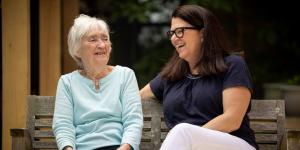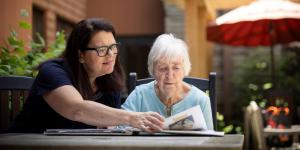Understanding Alzheimer’s Disease and Dementia

Are you worried about Alzheimer’s disease? Its effects on you or your loved ones? And what about dementia? That’s a pretty scary term, too.
You may be wondering what the difference is between Alzheimer’s disease and dementia. In actuality, “dementia” is an umbrella term used to describe a range of symptoms associated with cognitive impairment. People with dementia today include those with Alzheimer’s disease, but also include people with vascular dementia (cognitive problems due to impaired blood flow to the brain), Lewy body dementia (cognitive issues due to protein deposits that develop in nerve cells in the brain), and several others. Sometimes a person has more than one type of dementia at the same time; researchers call this “mixed dementia.” Alzheimer’s disease is the most common cause of dementia, which is why most researchers are focused on it, knowing that what we learn can no doubt help everyone with dementia.
At Hebrew SeniorLife’s Hinda and Arthur Marcus Institute for Aging Research, our goals for Alzheimer’s disease research include:
- Being able to detect Alzheimer’s disease early – even before clinical signs and symptoms appear.
- Identifying risk and protective factors.
- Testing and implementing interventions for modifiable lifestyle factors to reduce risks for getting Alzheimer’s disease, slowing disease progression, and improving a person’s quality of life.
- Improving our understanding of underlying pathophysiology.
- Designing, testing, and implementing pharmacological interventions.
While important, early diagnosis of Alzheimer’s disease is not always easy. You may worry that your occasional misplacing of your keys or forgetting someone’s name may be signs. Here is a comparison chart developed from the Alzheimer’s Association that can help you:
| Signs of Alzheimer’s Disease | Signs of Normal Aging |
| Memory loss that disrupts daily life | Occasionally forgetting something like a name or a date |
| Difficulty solving problems involving numbers | Sometimes making an adding error |
| Struggling to perform routine daily tasks, such as driving or managing finances | Sporadically making a careless error |
| Becoming confused about dates, seasons, or the passage of time | Forgetting what day it is but then quickly remembering |
| Difficulty reading, determining color, or judging distance | Vision problems due to physical issues like cataracts |
| Often using the wrong word | Occasionally forgetting a word |
| Losing things and struggling to retrace steps to find them | Losing things and then retracing steps to find them |
| Showing consistently poor judgment, including being reckless with money | Making a bad decision every once in a while |
| Regularly avoiding social functions or showing little interest in hobbies | Sometimes skipping a social engagement |
| Becoming confused, suspicious, depressed, or anxious | Becoming irritable when a routine is disrupted |
However, this list is not exhaustive and both dementia and normal aging can look quite different in different people. So if you have concerns about your memory or thinking, you should talk with your doctor.
Why is early detection important? Current treatments are more effective in earlier stages of Alzheimer’s disease. Plus a diagnosis allows a person with dementia to prioritize and to be proactive in planning for the future, along with their family members. An early diagnosis can provide an opportunity window to address modifiable lifestyle factors to reduce risks and slow the disease, with the goal of improving the quality of life for the person with dementia.
While there are no quick fixes or easy answers when it comes to Alzheimer’s disease and dementia, exercise and a healthy diet are two things we can all do to reduce our risks. It’s also important to stay socially involved and to keep your mind active. In the meantime, we will continue to do research to increase our understanding of this disease in order to offer help to affected adults and their families.
Blog Topics
Learn More
Free Guide to Brain Health
Download our free guide, “Optimizing Your Brain Health,” for expert advice on boosting brain health at any age. Explore practical tips and resources from Hebrew SeniorLife’s Deanna and Sidney Wolk Center for Memory Health.

Coping with Memory Loss
From our Wolk Center for Memory Health to our Adult Day Health program to Assisted Living to Memory Care Assisted Living, we offer a wide range of memory care services and support.



